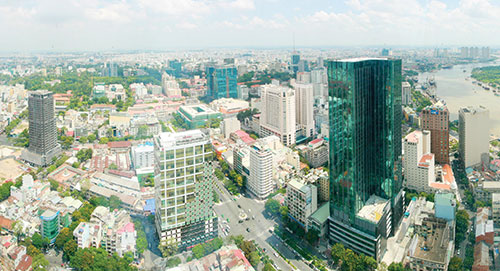Property looks to make comeback, Vietnam
23-09-2013
 After a number of years of uncertainty, people working in the real estate industry are finally beginning to breathe a little easier, as the market at last shows signs of turning. The residential sector, the most often talked about sector within the property market, has seen renewed activity from buyers, developers and investors as the market shows signs of passing through the bottom of the cycle.
After a number of years of uncertainty, people working in the real estate industry are finally beginning to breathe a little easier, as the market at last shows signs of turning. The residential sector, the most often talked about sector within the property market, has seen renewed activity from buyers, developers and investors as the market shows signs of passing through the bottom of the cycle.
The first half of 2013 has seen the government become more proactive in reviving the Vietnamese economy and most obviously, the real estate market. The two most significant initiatives of the government were the passing of Resolution 02/NQ-CP, which had implications to support the housing market, and the establishment of the Vietnam Asset Management Company (VAMC) to handle bad debts and mortgaged assets.
Under Resolution 02/NQ-CP, the State Bank of Vietnam will provide soft loans worth VND9 trillion (approx. $428 million) for real estate companies developing low-cost homes or converting relatively higher-class developments into low-cost developments at an annual rate of 6 per cent. Likewise, buyers of low-cost homes will also enjoy the benefit of preferential loans which create easier access to home ownership. Although the main focus of the loan package is low-cost housing and the conversion of more expensive properties, the expected positive impact of the package is to create spillover effects that revive the wider property market and building supplies industry. As a further part of Resolution, the National Assembly has approved a cut in the corporate income tax (CIT) from 25 per cent to 22 per cent, effective from January 1, 2014, and will further cut the rate to 20 per cent in 2016. This tax reduction policy, which aims to create more incentives for production, does not however apply to incomes from capital transfers, project transfers and real estate transfers, except income from social houses.
The establishment of the VAMC, a 100-percent state-owned company, aims to speed up the bad debt clearing process and to eventually enhance the credit supply of the economy by taking over approximately VND100 trillion ($4.75 billion) of bad debts off the books of the country’s banks. Once commercial banks can clear their bad debts, they are expected to provide greater liquidity to a market that still appears to be starved of capital.
The deliverability of both initiatives has been questioned to varying degrees, with the most common concern being as to how both schemes can be implemented and managed on the ground. Nevertheless, slow progress is being made and both schemes are beginning to see implementation on the ground.
Investment market sees increasing levels of interest
With confidence returning to the Vietnamese economy, the appetite for Vietnamese real estate appeared to grow in the first half of 2013.
CBRE has seen enquiries for investments increase 20-30 per cent year-on-year. Amongst these, old favourites Japan and Korea remain keen on Vietnam and are on the lookout for opportunities. Large conglomerates from both countries have remained constant in their interest in Vietnam throughout the downturn. Such groups are seeking to acquire existing assets, as well as development opportunities, both residential and commercial.
Elsewhere, there is a growing abundance of new capital beginning to look at Vietnam. A range of investors are looking for both direct asset deals, taking secondary positions in existing joint ventures (JV), as well as looking to establish new JV arrangements as the market enters a new cycle.
Taiwanese investors are another potential source of capital for the Vietnamese investment market. The opening up of Taiwanese insurance regulations has paved the way for real estate investment outside of Taiwan where competition for assets, owing to growing amounts of cash, has pushed yields to historically low levels. Ho Chi MInh City is one of six cities identified by the Taiwanese for outbound investment with several groups already stepping up their level of interest in the market. Most obviously, there remains a variety of Vietnamese capital returning to the market; this capital is considering a diverse range of assets ranging from 3 star hotel/Grade C offices, to large, international quality projects.

The second half of this year could be characterised by increased property transactionsPhoto: Le Toan
Investment interest is being converted into deals
Singaporean, Korean and Vietnamese investors accounted for the majority of investment activity in the first half of 2013.
A number of hotel transactions occured during the first half. These included the acquisition of 70 per cent of the Legend Hotel in Ho Chi Minh City’s District 1, in a deal worth $62.5 million. Lotte Hotels and Resorts acquired the stake in the hotel from VinaCapital’s Vietnam Opportunity Fund. Lotte is believed to be in the planning process to acquire the remaining 30 per cent.
In a second deal for the hospitality sector, Minor International Public Company Limited (MINT), head quartered in Thailand, announced the acquisition of Life Heritage Resort Hoi An and Life Resort Quy Nhon in February 2013 for $16 million.
Demand for operational assets in Vietnam persists. Although not a new investor to Vietnam, this was illustrated by Mapletree’s acquisition of the CentrePoint office building in a deal worth about $52-53 million.
Local investors have also been active in acquiring operating assets and are responsible for the most remarkable deal so far in Vietnam. The transfer of Vincom A Centre from VinGroup to the Vietnam Infrastructure and Property Development Group (VIPD) for VND9,823 billion (approximately $470 million), leaving Vingroup with an estimated profit of VND4,300 billion ($205 million) from the transfer. Furthermore, Vingroup has also established a strategic investment partnership agreement with a Warburg Pincus led consortium for Vincom Retail, Vietnam’s largest retail owner and operator. The investment of $200 million by Warburg Pincus, in return for 20 per cent interest in Vincom Retail, is the largest initial investment in a Vietnamese company by a private equity group.
Another example of Vietnamese capital being active in the market was the acquisition of a 66.7 per cent stake in the Sheraton Nha Trang Hotel & Spa at Nha Trang, Khanh Hoa province between seller VinaCapital and buyer Kinh Do. The property was transferred at the end of April 2013.
Although not as widely reported, there have been a number of off-market deals for residential development plots in the first half – with those on the ground having the best access to deals. There is growing interest for residential development land and if pricing is realistic, it is likely that there will be continued activity in this sector over the coming twelve months.
How to maximise on current opportunities
Whilst the increase in investment enquiries and activity may sound like a silver lining to what has been a particularly grey cloud for some, it is worth remembering that investors look to Vietnam for opportunistic returns. To generate such opportunistic returns, in advance of 25 per cent IRR for a project, the price at which an investor enters a project is key.
Too often in Vietnam, land or asset prices are inflated to levels which may reflect where rentals or sales prices may have been (or where some think they may have been heading) in 2008. Quite obviously, rentals and sales prices have declined notably since this time. As such, it is natural that asset and land prices will decline too. However, pricing remains the single biggest hurdle for investors looking at Vietnam, as valuations are not at levels which enable new investors to generate the 25 per cent plus returns that are necessary to enter. For groups looking to exit their current projects, realistic pricing is an essential that cannot be compromised on.
In addition to valuations, the three other major hurdles which domestic groups must overcome if they are to secure foreign investment are:
-A proven track record
-Prudent and efficien structures
-Providing transparency to incoming groups
Whilst there will be an increase in investors coming into Vietnam in the second half of 2013, unless these four points are met, investors will be unlikely to open their wallets and the momentum building within the market may again be lost.
http://www.vir.com.vn/news/en/property/property-looks-to-make-comeback.html






